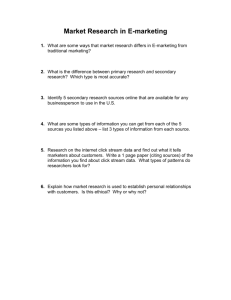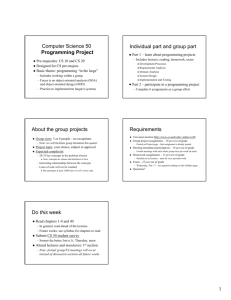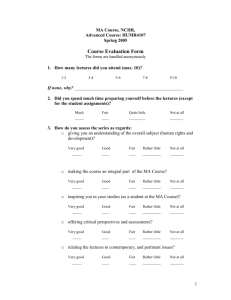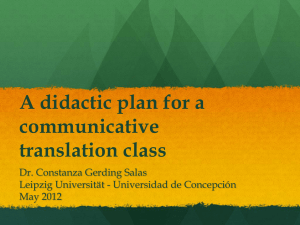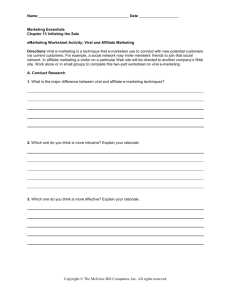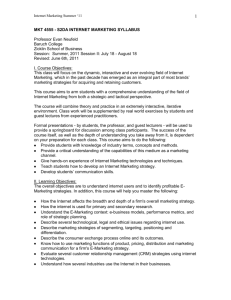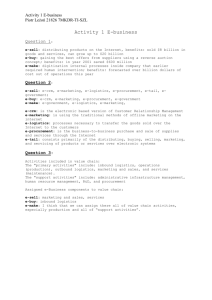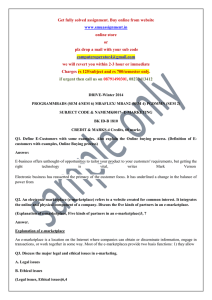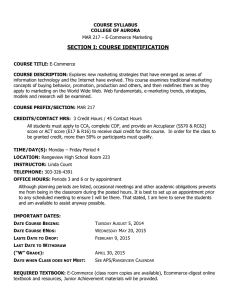Online Marketing and Media
advertisement
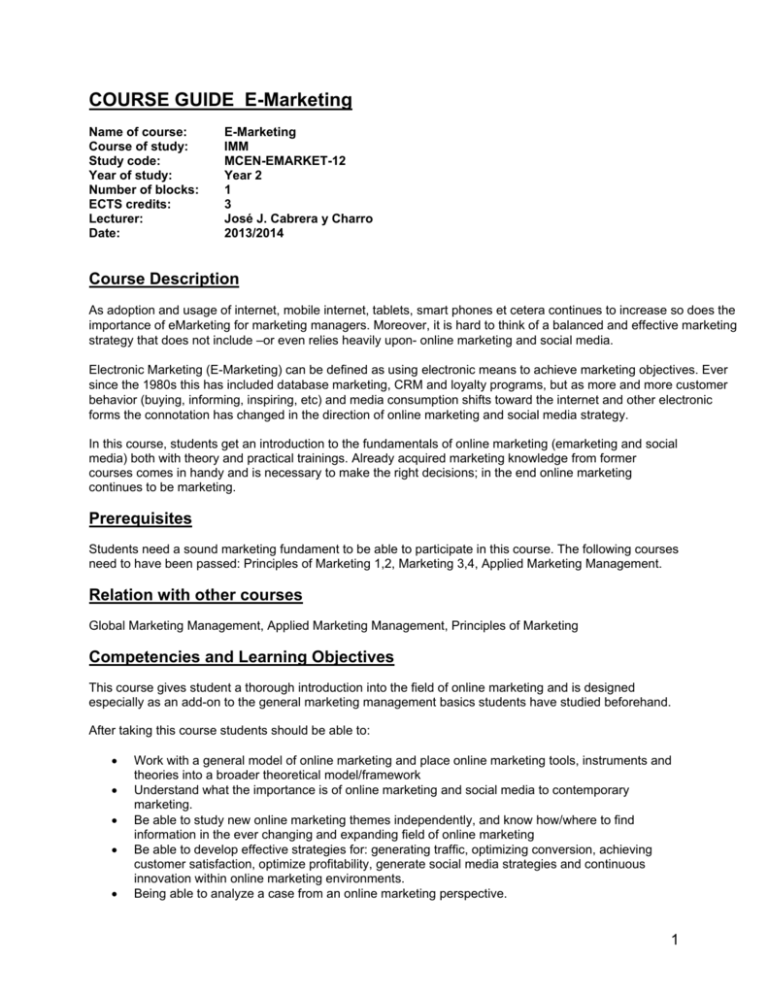
COURSE GUIDE E-Marketing Name of course: Course of study: Study code: Year of study: Number of blocks: ECTS credits: Lecturer: Date: E-Marketing IMM MCEN-EMARKET-12 Year 2 1 3 José J. Cabrera y Charro 2013/2014 Course Description As adoption and usage of internet, mobile internet, tablets, smart phones et cetera continues to increase so does the importance of eMarketing for marketing managers. Moreover, it is hard to think of a balanced and effective marketing strategy that does not include –or even relies heavily upon- online marketing and social media. Electronic Marketing (E-Marketing) can be defined as using electronic means to achieve marketing objectives. Ever since the 1980s this has included database marketing, CRM and loyalty programs, but as more and more customer behavior (buying, informing, inspiring, etc) and media consumption shifts toward the internet and other electronic forms the connotation has changed in the direction of online marketing and social media strategy. In this course, students get an introduction to the fundamentals of online marketing (emarketing and social media) both with theory and practical trainings. Already acquired marketing knowledge from former courses comes in handy and is necessary to make the right decisions; in the end online marketing continues to be marketing. Prerequisites Students need a sound marketing fundament to be able to participate in this course. The following courses need to have been passed: Principles of Marketing 1,2, Marketing 3,4, Applied Marketing Management. Relation with other courses Global Marketing Management, Applied Marketing Management, Principles of Marketing Competencies and Learning Objectives This course gives student a thorough introduction into the field of online marketing and is designed especially as an add-on to the general marketing management basics students have studied beforehand. After taking this course students should be able to: Work with a general model of online marketing and place online marketing tools, instruments and theories into a broader theoretical model/framework Understand what the importance is of online marketing and social media to contemporary marketing. Be able to study new online marketing themes independently, and know how/where to find information in the ever changing and expanding field of online marketing Be able to develop effective strategies for: generating traffic, optimizing conversion, achieving customer satisfaction, optimize profitability, generate social media strategies and continuous innovation within online marketing environments. Being able to analyze a case from an online marketing perspective. 1 Be able to define the essence of E-marketing and its importance in a company’s overall Marketing plan. Get general knowledge of the online marketing tools that are currently most effective through theory and case studies. Learn how to use the internet as a research method and learn and practice on how to publish information on the internet themselves. 3. Specific course objectives: 1. Possibilities of online/Internet marketing: Rather than only passively using the Internet it is much more Interesting to use it actively. Internet is a potential moneymaking machine and in this course you will learn the basics of how to use online marketing in a profitable way. Which decisions need to be taken and where to base them on? 2. Generating a online business idea and developing a businessplan and an investors pitch Students go through all the steps from idea to pitch. Main deliverables are a report and a pitch to seasoned business men and investors. The business idea needs to be summarized and presented in a business plan. Ideas must have an online orientation. 3. Writing a chapter of an online marketing book Student groups will research online marketing themes in detail and present their findings in a chapter of an online marketing book, and a class-room presentation. Students learn how to research an online marketing tool to such a detailed level that they can give a general marketing manager advice on how to use the tool Didactic forms The primary didactic form is lectures that provide an introduction and overview of methodologies, techniques used and possibilities as used today. In order to prepare for the lecture, the students have to read the relevant reading material and do their own research on the subject discussed. Every week several topics will be discussed and students need to be up-to-date with the creation of their own website. The secondary didactic form is consultancy lectures and for individual groups work doing the assignments. Literature Reading material will be handed out in class. Assessments The assessment will be based on two assignments of groups work and upon a final group report s and presentations in week 7. The first assignment is developing a business idea with an online orientation. This idea is detailed into a business model, traffic generation, etc (all course theoretical elements need to be included) and presented to a jury of seasoned entrepreneurs and investors (Dragons’ Denn). The students need to prepare a 10-15 page business plan as well. Total weight of this assignment in the final grade is of 67%. This grade is made up out of the average of three sub-grades for: The quality of the business plan The presentation Group participation and chemistry 2 The second assignment consists of writing (as a group) a chapter of an online marketing book (www.onlinemarketingi60minutes.com). Each groups gets a particular subject they need to research in detail (e.g. bannering or using Facebook as an advertising tool) and write a 10-15 page chapter on. Chapters are published to the internet by the use of WordPress. Total weight of this assignment in the final grade is of 33%. This grade is made up out of the average of thre sub-grades for: Quality of work at consult moemnts Presentation Chapter published on the internet. Both assignments have to score 5,5 or higher. All elements of the assignment (presentations, chapter, business plan) have to be handed in before the deadline in order to score. Students receive detailed instructions on the assignments in class. Evaluation By departmental evaluation form. Weekly activity This is a 5 EC course (140 hours), consisting of: * Classes 14 hours * consultancy / walk-ins 28 hours * self-study and assignments 98 hours All theory lectures are 120 minutes, a detailed schedule of lectures and topics will be presented at the first class. 3
